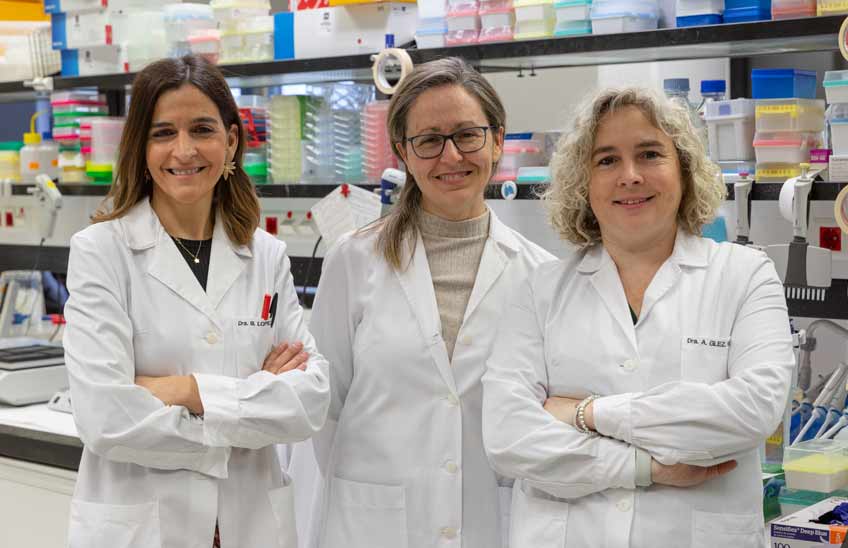Biomarker Identified as an Indicator of Successful Heart Failure Treatment
Researchers at Cima University of Navarra and Germans Trias i Pujol University Hospital demonstrate that low blood levels of a collagen derivative are associated with a better response to therapy for this cardiovascular disease and reduce the risk of hospitalizations.

PhotoManuelCastells
/From left to right: Begoña López, Susana Ravassa and Arantxa González Miqueo, researchers in cardiovascular diseases at Cima University of Navarra.
13 | 03 | 2023
Researchers at Cima University of Navarra and Germans Trias i Pujol University Hospital have identified a biomarker of heart damage that indicates which patients with heart failure respond better to conventional therapy and which are at greater risk of worsening. In a large sample of more than 1,000 patients with long-term follow-up, they have shown that those patients with low blood levels of PICP, a collagen derivative associated with cardiac fibrosis, improve their cardiac function after treatment and have a lower risk of future hospitalizations and death. This study represents a major advance in the understanding of the pathological mechanisms that may influence the efficacy of treatments for heart failure and offers a new tool that could help to better prevent and treat heart disease in the future.
The scientific journal JACC: Heart Failure, from the group Journal of the American College of Cardiologypublishes this work in which several of its researchers belong to the research center Biomedica en network en Enfermedades Cardiovasculares (CIBERCV) and the Instituto de research Sanitaria de Navarra (IdiSNA).
Response of the heart in cardiovascular disease
Cardiovascular diseases are the leading cause of death in the world and many often lead to heart failure, a chronic condition that limits the heart's ability to pump sufficient blood to the other organs. Despite therapeutic advances, many patients with heart failure worsen, are frequently hospitalized and have a high mortality rate.
"In this study we have used the PICP peptide to identify which patients respond best to conventional therapies in heart failure, and in which they should be reinforced, thus advancing towards the implementation of a personalized medicine strategy in this disease," explains Susana Ravassa, researcher in the Cardiovascular Diseases Program at Cima University of Navarra and first author of work.
Josep Lupón, researcher of the Cardiology Department and the Heart Failure Unit of the Germans Trias i Pujol University Hospital, also first author of the study, argues that to improve the personalized treatment of these patients "we must delve deeper into the alterations that underlie the development of heart failure. It is very common for the heart of these patients to present fibrosis, which can have an impact on their evolution and response to treatment".
New predictive tool to treat heart failure
In previous work, researchers at Cima demonstrated the potential of PICP as a biomarker of fibrosis. "The results of this work confirm the relevant role of fibrosis in myocardial remodeling that contributes to development heart failure. Furthermore, PICP emerges as a promising biomarker to improve phenotyping and risk stratification in patients with this disease. Advancing in the research of this biomarker will help to consolidate it as a useful tool to identify patients who will benefit from anti-fibrotic therapy, and to assess response to treatment," notes Arantxa González Miqueo, director of the Cardiovascular Diseases Program at Cima University of Navarra and one of the lead authors of work.
This study has been carried out in the framework of project MINERVA II funded by the Government of Navarra. It has also been supported by the Instituto de Salud Carlos III, the Spanish Ministry of Science, Innovation and Universities and the European Commission, among other institutions.
reference letter bibliographic
→ Ravassa, Susana et al. "Prediction of Left Ventricular Reverse Remodeling and Outcomes by Circulating Collagen-Derived Peptides." JACC. Heart failure vol. 11,1 (2023): 58-72. doi:10.1016/j.jchf.2022.09.008.




